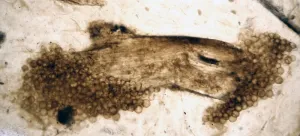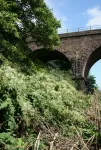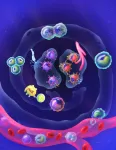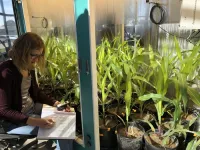(Press-News.org) Fossil site is ‘Rosetta Stone’ for understanding early life
Leading edge technology has uncovered secrets about a world-renowned fossil hoard that could offer vital clues about early life on earth.
Researchers who analysed the 400 million-year-old-cache, found in rural north-east Scotland, say their findings reveal better preservation of the fossils at a molecular level than was previously anticipated.
Fresh scrutiny of the exquisitely preserved treasure trove from Aberdeenshire has enabled scientists to identify the chemical fingerprints of the various organisms within it.
Just as the Rosetta Stone helped Egyptologists translate hieroglyphics, the team hopes these chemical codes can help them decipher more about the identity of the life forms, that other more ambiguous fossils represent.
The spectacular fossil ecosystem near the Aberdeenshire village of Rhynie was discovered in 1912, mineralised and encased by chert – hard rock composed of silica.Known as the Rhynie chert, it originates from the Early Devonian period – about 407 million years ago – and has a significant role to play in scientists understanding of life on earth.
Researchers combined the latest non-destructive imaging with data analysis and machine learning to analyse fossils from collections held by National Museums Scotland and the Universities of Aberdeen and Oxford.Scientists from the University of Edinburgh were able to probe deeper than has previously been possible, which they say could reveal new insights about less well-preserved samples.
Employing a technique known as FTIR spectroscopy – in which infrared light is used to collect high-resolution data – researchers found impressive preservation of molecular information within the cells, tissues and organisms in the rock.
Since they already knew which organisms most of the fossils represented, the team was able to discover molecular fingerprints that reliably discriminate between fungi, bacteria and other groups.
These fingerprints were then used to identify some of the more mysterious members of the Rhynie ecosystem, including two specimens of an enigmatic tubular “nematophyte”.
These strange organisms, which are found in Devonian – and later Silurian – sediments have both algal and fungal characteristics and were previously hard to place in either category. The new findings indicate that they were unlikely to have been either lichens or fungi.
Dr Sean McMahon, Chancellor’s Fellow from the University of Edinburgh’s School of Physics and Astronomy and School of GeoSciences, said: “We have shown how a quick, non-invasive method can be used to discriminate between different lifeforms, and this opens a unique window on the diversity of early life on Earth.”
The team fed their data into a machine learning algorithm that was able to classify the different organisms, providing the potential for sorting other datasets from other fossil-bearing rocks.
The study, published in Nature Communications, was funded by The Royal Society, Wallonia-Brussels International and the National Council of Science and Technology of Mexico.
Dr Corentin Loron, Royal Society Newton International Fellow from the University of Edinburgh’s School of Physics and Astronomy said the study shows the value of bridging palaeontology with physics and chemistry to create new insights into early life.
“Our work highlights the unique scientific importance of some of Scotland’s spectacular natural heritage and provides us with a tool for studying life in trickier, more ambiguous remnants,” Dr Loron said.
Dr Nick Fraser, Keeper of Natural Sciences at National Museums Scotland, believes the value of museum collections for understanding our world should never be underestimated. He said:
“The continued development of analytical techniques provides new avenues to explore the past. Our new study provides one more way of peering ever deeper into the fossil record.”
For further information, please contact: Rhona Crawford, Press and PR Office, 07876391498, rhona.crawford@ed.ac.uk
END
Fossil site is ‘Rosetta Stone’ for understanding early life
Leading edge technology has uncovered secrets about a world-renowned fossil hoard that could offer vital clues about early life on earth.
2023-03-17
ELSE PRESS RELEASES FROM THIS DATE:
3D-printed revolving devices can sense how they are moving
2023-03-17
Integrating sensors into rotational mechanisms could make it possible for engineers to build smart hinges that know when a door has been opened, or gears inside a motor that tell a mechanic how fast they are rotating. MIT engineers have now developed a way to easily integrate sensors into these types of mechanisms, with 3D printing.
Even though advances in 3D printing enable rapid fabrication of rotational mechanisms, integrating sensors into the designs is still notoriously difficult. Due to the complexity of the rotating parts, sensors are typically embedded manually, after the device has already ...
Tackling gambling harm among Armed Forces veterans
2023-03-17
Swansea University News Release
17 March 2023
£1 million for projects involving Swansea experts to tackle gambling harm among Armed Forces veterans
Research to tackle gambling harm among Armed Forces veterans has received a major boost with three awards, totalling £1 million, for new projects in the field that involve Swansea University experts.
The projects include evaluating a smartphone app for veterans with gambling disorder and PTSD, which is aimed at reducing symptoms,
The three projects ...
Rivers and streams in the Andean Cordillera are hot spots for greenhouse gases emissions
2023-03-17
A new scientific study by researchers from the University of Liège (Belgium) shows that rivers in the Andean mountains contribute 35% and 72% of riverine emissions of carbon dioxide (CO2 ) and methane (CH4 ) in the Amazon basin, the world's largest river. This study is published in the journal Communications Earth & Environment.
Rivers contribute substantially to global emissions of carbon dioxide (CO2) and methane (CH4). The Amazon River, the World's largest river, plays an important role in greenhouse gas (GHG) emissions. It is the largest river on the planet in terms of freshwater flow," explains Alberto Borges, ...
Dual-task walking performance may be an early indicator of accelerated brain aging
2023-03-17
Boston, MA -- Walking is a complex task that is most commonly performed while completing other tasks like talking, reading signs, or making decisions. For most, after the age of 65, such “dual tasking” worsens walking performance and may even cause unsteadiness. Intriguingly, older adults that are more affected by dual tasking are at higher risk of suffering adverse health outcomes, including both falls and dementia.
A new research study published in Lancet Healthy Longevity has reported that the ability to dual task when walking starts to decline by the age of 55, up to a decade before ‘old ...
New study counts the environmental cost of managing Japanese knotweed
2023-03-17
New Swansea University research has looked at the long-term environmental impact of different methods to control Japanese knotweed.
The invasive species has been calculated to cost more than £165 million to manage every year in the UK alone. Its presence can blight property purchases for households across the country.
This has led to the development of different ways of trying to control it but with sustainability becoming increasingly important, understanding the effect of these management methods is vital.
A new study, led by biosciences lecturer Dr Sophie Hocking and looking ...
Discovery of an unexpected function of blood immune cells : Their ability to proliferate !
2023-03-17
The ability of a cell to divide, to proliferate, is essential for life and gives rise to the formation of complex organisms from a single cell. It also allows the replacement of used cells from a limited number of “stem” cells, which then proliferate and specialize. In cancer, however, cell proliferation is no longer controlled and becomes chaotic. Researchers from the GIGA Institute at the University of Liège have discovered that, in a healthy individual, certain blood immune cells, the monocytes, ...
Women working rotating shifts especially likely to be frail, York study finds
2023-03-17
March 17, 2023, TORONTO — A new study led by researchers at York University has found a link between shift work and frailty among middle-aged and older workers in Canada, especially for women on rotating shifts.
While there is a large body of research suggesting the disruptions to circadian rhythms that shift workers experience are linked to various illnesses, this study was the first to take a comprehensive or “holistic” look at the connection between shift work and frailty.
“We cannot ignore the negative health outcomes related to shift work, including cardiovascular diseases, ...
Argonne hosts conference for undergraduate women in physics
2023-03-17
The U.S. Department of Energy’s (DOE) Argonne National Laboratory hosted an American Physical Society (APS) Conference for Undergraduate Women in Physics (CUWiP) on Jan. 20-22. The conference series, sponsored by DOE and the National Science Foundation, is designed to support undergraduate women and gender minorities in physics by connecting them with resources, community, information on graduate school and professionals in their field. It also provides students with access to other women in physics with whom they can share experiences, advice and ideas.
The January 2023 event is one of 14 APS CUWiP events hosted across the country and ...
How can we tackle the biggest challenges? Ask a plant
2023-03-17
LOS ALAMOS, N.M., March 16, 2023 — Without plants, we’d have no air to breathe or food to eat, yet plant science lingers in the shadowy wings while other fields take center stage. With the goal of shining the spotlight on plants, a new study presents the field’s top 100 most pressing questions for research to address the greatest challenges facing humanity.
“The study highlights the importance of plant science for society by laying out myriad questions and technical challenges ...
Genes shed light on why men and women experience different depression symptoms
2023-03-17
Depression is widely reported to be more common in women than in men, with women twice as likely to receive a diagnosis than men. A new sex-specific study from McGill University has found that there are differences between male and female genes and how they relate to depression. In a study of more than 270,000 individuals, the researchers found that sex-specific prediction methods were more accurate in forecasting an individual’s genetic risk of developing depression than prediction methods that did not specify sex. The researchers found ...
LAST 30 PRESS RELEASES:
New knowledge on heritability paves the way for better treatment of people with chronic inflammatory bowel disease
Under the Lens: Microbiologists Nicola Holden and Gil Domingue weigh in on the raw milk debate
Science reveals why you can’t resist a snack – even when you’re full
Kidney cancer study finds belzutifan plus pembrolizumab post-surgery helps patients at high risk for relapse stay cancer-free longer
Alkali cation effects in electrochemical carbon dioxide reduction
Test platforms for charging wireless cars now fit on a bench
$3 million NIH grant funds national study of Medicare Advantage’s benefit expansion into social supports
Amplified Sciences achieves CAP accreditation for cutting-edge diagnostic lab
Fred Hutch announces 12 recipients of the annual Harold M. Weintraub Graduate Student Award
Native forest litter helps rebuild soil life in post-mining landscapes
Mountain soils in arid regions may emit more greenhouse gas as climate shifts, new study finds
Pairing biochar with other soil amendments could unlock stronger gains in soil health
Why do we get a skip in our step when we’re happy? Thank dopamine
UC Irvine scientists uncover cellular mechanism behind muscle repair
Platform to map living brain noninvasively takes next big step
Stress-testing the Cascadia Subduction Zone reveals variability that could impact how earthquakes spread
We may be underestimating the true carbon cost of northern wildfires
Blood test predicts which bladder cancer patients may safely skip surgery
Kennesaw State's Vijay Anand honored as National Academy of Inventors Senior Member
Recovery from whaling reveals the role of age in Humpback reproduction
Can the canny tick help prevent disease like MS and cancer?
Newcomer children show lower rates of emergency department use for non‑urgent conditions, study finds
Cognitive and neuropsychiatric function in former American football players
From trash to climate tech: rubber gloves find new life as carbon capturers materials
A step towards needed treatments for hantaviruses in new molecular map
Boys are more motivated, while girls are more compassionate?
Study identifies opposing roles for IL6 and IL6R in long-term mortality
AI accurately spots medical disorder from privacy-conscious hand images
Transient Pauli blocking for broadband ultrafast optical switching
Political polarization can spur CO2 emissions, stymie climate action
[Press-News.org] Fossil site is ‘Rosetta Stone’ for understanding early lifeLeading edge technology has uncovered secrets about a world-renowned fossil hoard that could offer vital clues about early life on earth.






